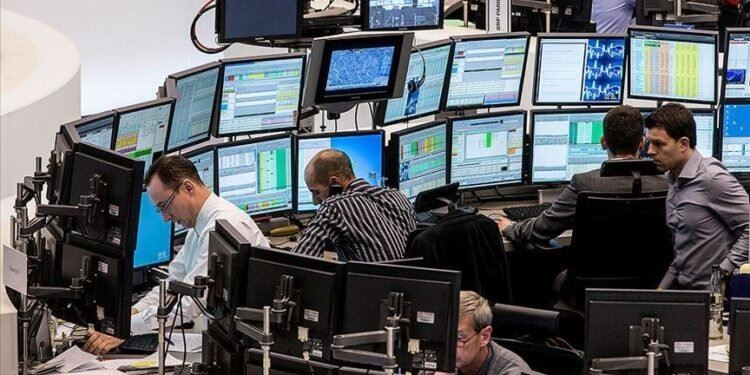While it is seen that the new week started positively with the decrease of concerns about inflation and growth in global markets, the statements of central bank officials as well as the intense data agenda are expected to determine the course of the markets throughout the week.
Risk appetite increased with the interpretation of the May meeting minutes of the US Federal Reserve (Fed), announced last week, as the awareness of inflationary pressures and the possibility to wait in September, if necessary, by being flexible in interest rate hikes. In addition, the fact that personal consumption expenditures, which were announced in the USA on Friday and taken into account by the Fed as an indicator of inflation, recorded the lowest annual increase in 4 months on an annual basis, indicating that inflationary pressures will decrease.
The globally announced Manufacturing Industry Purchasing Managers Index (PMI) data also increased the comments that the recession risk is low despite the slowdown in economic activity.
With these developments, it is seen that investors are putting their concerns about inflation and growth into the background, and the data to be announced this week is critical as investors receive signals about how flexible the Fed can act in interest rate hikes. In this context, the meeting of Fed Chairman Jerome Powell with US President Joe Biden will be followed, as well as the report on non-farm employment in the USA and the Beige Book.
Analysts noted that in the new week, in which inflation data in the Eurozone and Germany will also be followed, growth, inflation and foreign trade balance data in the country came to the fore. On the other hand, analysts reminded that the Fed will start shrinking its balance sheet this week and said that the activity in the bond market should be monitored.
With these developments, purchases in the New York stock market strengthened on Friday and indices completed the week at their highest level in about a month, after an 8-week decline. The Dow Jones index gained 1.76 percent, the S&P 500 index gained 2.47 percent and the Nasdaq index gained 3.33 percent. The average rise of the indices on a weekly basis was 6.6 percent. The US 10-year bond yield ended the third consecutive week with a decline and stabilized at 2.75 percent. The dollar index, on the other hand, dropped to 101.5 today, after closing at 101.6 with a decrease of 1.3 percent last week.
On the European side, while the messages from the European Central Bank (ECB) were perceived as "hawks" in the face of increasing inflationary pressures, expectations that the bank will take the first step to increase interest rates in July have strengthened. Despite the ongoing uncertainties regarding the Russia-Ukraine war, stock markets rose on Friday, led by technology stocks, with the increasing risk appetite globally. While DAX 30 index increased by 1.62 percent in Germany, FTSE 100 index increased by 0.27 percent in England and CAC 40 index increased by 1.64 percent in France, the gains of indices on a weekly basis exceeded 3 percent. The euro/dollar parity, which completed the last week with a 1.6 percent appreciation, is moving at the highest level of the last month with 1.0760 today.
While the measures implemented within the scope of the new type of coronavirus (Kovid-19) epidemic in China throughout Asia remain at the center of the agenda, the guidance of the Bank of Japan (BoJ), which, unlike its peers, has adopted a loose monetary policy, is also closely followed. BoJ Chairman Haruhiko Kuroda said the yen has regained stability after an undesirable weakening, while vowing to patiently adhere to strong monetary easing to support declining economic activity in the region due to Covid-19. With these developments, it was observed that the new week started with buyers in Asian stock markets, while the Shanghai composite index in China increased by 0.3 percent, Nikkei 225 index in Japan increased by 2.2 percent and Hang Seng index in Hong Kong increased by 1.9 percent.
In Borsa Istanbul, which followed a fluctuating course on Friday last week, the BIST 100 index lost 0.49 percent and closed at 2,438.84 points. The index gained 2.8 percent on a weekly basis. After closing at 16,2192 with an increase of nearly 2 percent last week, Dollar/TL started the new week at 16,3650 at the opening of the interbank market.
Analysts stated that inflation and growth-oriented concerns, which have caused sharp declines in global stock markets for a while, have been pushed into the background, although they have not been completely eliminated, and said that a critical week has been entered in terms of the announced data and verbal guidance.
Reminding that the markets in the USA are closed today due to a holiday, analysts stated that today's data agenda is the consumer confidence index in the Euro Area and inflation in Germany.
Analysts reported that technically, 2,390 points in the BIST 100 index are in the support position, and the 2.470 and 2,500 levels are in the resistance position.
Economists, who participated in the survey conducted by AA Finans regarding the first quarter growth data to be announced tomorrow, expect the Turkish economy to grow by 7.2 percent in the first quarter. The average of economists' growth expectations for the whole of 2022 was 3.5 percent.
The data to be followed in the markets today are as follows:
12.00 Eurozone, consumer confidence index for May
15.00 Germany, May CPI











Comments
No comment yet.